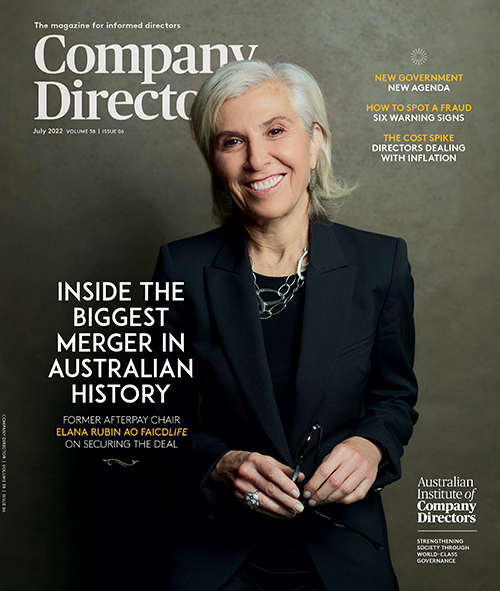Tasmanian Gold Medal award-winner 2021 Dr Rod Roberts FAICD joined the Institute of Directors in Australia, which became the AICD, in 1979.
- As told to Jessica Mudditt.
After serving in World War II, both my parents returned to Australia with great optimism. With a rush of blood, they bought a small mixed farm near Wynyard in north-west Tasmania, taking on a lot of debt. They struggled a lot financially and seeing that as a child imprinted on me the importance of cash flow and debt.
I didn’t have a long-term aspiration to become a director — I suppose it was just career progression. I was an investment banker in Sydney at County NatWest, which became Citibank, and was invited to sit on its Australian board in 1979. I joined AICD at the same time and for a short period was a guest teacher in the directors’ program. I’d been a teacher at the beginning of my career, although only for a couple of years after my undergraduate degree.
Some people wrongly see the AICD as just for the big end of town. Nowadays, there are a lot of members from the NFP and public sectors. They weren’t anywhere near as represented 40 years ago, and that is a constituency the AICD has had to address. As for the challenges, we need to be careful we don’t become another social lobby group. We should stay as much as we can with directorial responsibilities and retain fiscal issues as an important focus.
Managing expectations
The best and the hardest thing about being a director is accountability. You carry the expectations and hopes of shareholders, staff and customers. When things are going well, it’s fantastic. But when they’re going less well, and that continues for an extended period, it can be very difficult for many people.
In listed companies, performance is relatively public and transparent; in the unlisted space less so, but just as real. For example, as a young man, I brought a company out of receivership. It was a car parts automotive business in Sydney that found itself in the hands of an accounting firm. More recently, I acquired a 50 per cent interest in the business and assets of a winery — again from an insolvency firm. Insolvency circumstances inevitably mean that good people are damaged — staff lose jobs and creditors lose money.
When a company is in poor shape, listed or proprietary, there’s inevitably a lot of uncertainty among staff, customers and suppliers. As a manager and as a director, it’s important to afford those in the business some kind of stability, direction and reassurance. Apart from capital management, I’ve found that often, simple and clear change is sufficient to revitalise a struggling company or division.
Keep customers front of mind
As a director with a number of entities over the years, I try to keep a dual focus on both the cash flow and the customer. We need to “know” the customer and speak to them personally, if possible. Of course, customer groups can be highly disaggregated and hard to reach. It’s axiomatic, but if you’re not addressing the customer’s needs and desires, you’re not offering a service or product in which they’re going to be interested.
I’ve worked through several cycles and recessions, and business downturns can creep up on us quickly. If there is a period of cyclical down, as opposed to a snap-down like the GFC, it can force us to quit the non-productive. As directors, we need to manage gearing and be prepared to make difficult decisions, such as parting company with a “family jewel”. Nonetheless, we must continue to invest in what we see as the future. It can be a challenging balancing act.
It’s important to have some involvement in the NFP sector — it helps ground us as individuals. Some of my most rewarding work was done on the University of Tasmania board, where I was deputy chancellor for a decade. The Royal Flying Doctors (Tasmania) , where I’m presently on the board, does important and often unheralded work, such as its regional dental program.
Returning home
I returned to Tasmania 25 years ago, probably because of something the Germans call heimat, which doesn’t translate to English easily, but relates to “homeland” and “place”. I went back for a job as managing director of a listed agricultural company. My early background was in farming and it taught me you can’t do anything in life unless you get involved. I happily returned to it after a couple of decades in finance.
Although I’ve stood back from public boards, my wife, Cecile, and I still have a strong connection with Sydney and retain an apartment there. But COVID-19 has kept us largely island-bound of late — happily so. We have 20ha of vineyard and work is underway on another 10. The property also has 600ha of grazing country, a substantial portion of which we’ve fenced off for nature. Launching our Ossa wines brand has been stimulating and rewarding.
Latest news
Already a member?
Login to view this content



